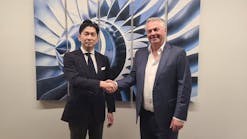Execs Boarding Planes, Hitting the Road Again, but Business Travel Still Below Pre-Pandemic Levels
Jun. 3—Bret Piatt, CEO of San Antonio-based Jungle Disk, has resumed traveling to meet in person with some of his cybersecurity company's biggest customers.
For Piatt, the need for business travel goes beyond client relations. Having recently returned from visiting Jungle Disk's offices in Europe, Piatt is asking employees to gather for strategic planning sessions face-to-face several times a year, believing that it's easier to get employees to work well together who have gotten to know each other face to face.
Also, not having to cope with lagging audio and poor internet connections adds to the appeal of meeting in person, Piatt said. Such benefits of business travel "more than pays for itself."
But that doesn't mean being there is always imperative, as the need to lean into modern communications brought on by the COVID-19 pandemic has shown that video and phone calls can be effective substitutes in many situations. Jungle Disk recently acquired Los Angeles-based ElephantDrive and did not meet the company's employees in person until after the transaction closed.
"Those sorts of things would not have happened before COVID," Piatt said.
Piatt and Jungle Disk's mixed approach to hitting the road again is indicative of what the business travel industry is seeing: After cratering at the onset of the coronavirus pandemic, it is showing signs of at least partially rebounding — thanks in large part to vaccines — as conferences resume, offices reopen and more people are willing to meet in person again.
But while bookings are up, they have not returned to pre-pandemic levels, as video calls appear to have permanently replaced some face-to-face meetings. Meanwhile, many have concerns about how flight delays and rising prices could affect the segment's recovery.
In recent months, more companies have gotten back on the road or plan to, a poll by the Global Business Travel Association shows.
Of the 520 respondents polled in April, 20 percent said they have scrapped or suspended most or all domestic business trips, down from 33 percent in a February poll. Regarding international business travel, the percentage of those who reduced such trips fell to 45 percent in April from 71 percent in February.
Similarly, a survey by the Census Bureau in mid-April found that about 36.4 percent of participating small businesses anticipate spending money on flights, car rentals and other expenses in the next six months — up from about 31.5 percent during a similar time period last year.
"We're seeing significant gains in the return of business travel," said Suzanne Neufang, CEO of the Global Business Travel Association. "This comes even as the industry faces challenges beyond COVID-19, including rising fuel prices, inflation, supply chain disruption and war in Ukraine."
That continuum of readiness to get back out there is reflected by two of San Antonio's largest employers.
Employees at Frost Bank are "cautiously traveling more," spokesman Bill Day said, noting that the company's operations are in Texas and thus its travel budget is fairly small. "Where it makes sense, we still emphasize efficiency, so we do a lot more meeting via Microsoft Teams than we do traveling."
Meanwhile, USAA is "back to business as usual regarding business travel," spokesperson Christian Bove said.
International recovering slower
At San Antonio-based Plus One Robotics, which makes software for robots used for logistics, business has boomed during the pandemic as online shopping exploded.
Brent Barcey, vice president of sales and business development, said he and other employees have been "traveling consistently" to perform installations and participate in trade shows since fall 2020.
"We get more done together than we do trying to get everybody lined up on a Teams or a Zoom call," Barcey said.
But when getting together means getting overseas, it can be tough.
Traveling internationally has been challenging because of a patchwork of pandemic-related requirements that vary from place to place. On one occasion, Plus One employees arrived in Europe only to be sent back because their paperwork did not seem to be in order, Barcey said.
"There's so much more pre-planning than there used to be," he said. "There's a lot of just kind of added stress."
The risk of contracting COVID-19 and having to quarantine for days is a concern, Piatt said.
"People have more anxiety about travel, but I think they still see and value the human contact and relationship piece," he said.
Business travel in the U.S. and North America has come back faster than travel to Europe, South America and Asia, and such travel remains restricted in China, said Henry Harteveldt, a travel industry analyst and president of Atmosphere Research Group.
More people are comfortable meeting face-to-face again, and more trade shows and conferences are taking place. Many companies have added employees and expect to hit pre-pandemic travel spending levels by 2023, Harteveldt said.
And yet travel managers and chief financial officers have told him they don't expect employees to travel individually for business as much as they did before the pandemic. They are holding more virtual meetings and cutting back on traveling for internal business reasons.
Harteveldt said they've also told him that 15 to 30 percent of their workers are not ready to get on a plane or in a car again.
Hotels and planes
Texas hoteliers will end 2022 down an estimated $1.2 billion in revenue from business travelers compared with pre-pandemic levels, according to a report by the American Hotel & Lodging Association and Kalibri Labs.
Revenue at San Antonio hotels is projected to be down about $116 million, or 17.7 percent, compared with 2019. Business travel includes corporate, group, government and other commercial travel.
"While dwindling COVID-19 case counts and relaxed (Centers for Disease Control and Prevention) guidelines are providing a sense of optimism for reigniting travel, this report underscores how tough it will be for many hotels and hotel employees to recover from years of lost revenue," said Chip Rogers, president and CEO of the Hotel & Lodging Association.
"The good news is that after two years of virtual work arrangements, Americans recognize the unmatched value of face-to-face meetings and say they are ready to start getting back on the road for business travel," Rogers said.
Likewise, the airline industry is expressing optimism regarding business travel.
Although San Antonio International Airport does not routinely track the number of business travelers passing through it, passenger counts generally are rising. About 767,099 passengers flew through the airport in April, up 40.4 percent from April 2021 but down 11 percent from April 2019, which was the highest April on record.
During a recent earnings call, American Airlines CEO Robert Isom said he expects business travel overall to be 90 percent recovered in the second quarter and that international trips have increased as restrictions have been eased.
"Corporate bookings are the highest that they've been since the onset of the pandemic, and we expect that to continue as more companies reopen their offices," Isom said.
On a United Airlines earnings call, CEO Scott Kirby also said business travel is improving but has not fully rebounded.
"We expect United will benefit more than any other airline as that recovery continues," Kirby said. "International, especially Asia, is far from fully recovered. United is just more exposed to those sectors."
Delta Air Lines reported domestic corporate sales were about 50 percent recovered and international corporate sales were about 35 percent recovered in the first quarter.
"As omicron faded, offices reopened and travel restrictions were lifted, resulting in an improvement in business travel demand and a stronger fare environment," the company stated.
Travelers, meanwhile, are dealing with delays and cancellations, in part because airlines, hotels and rental car companies are struggling to hire enough employees.
There are far fewer flights than there were before the pandemic, and hotels are sometimes limiting capacity, Harteveldt said. As a result, executives may postpone or scrap trips for business, which could affect the segment's recovery.
"One big thing for business travelers will be the reliability and confidence they have in being able to reach their destination," he said. "There are a lot of companies that are looking at the cutbacks airlines are making, ... and it's starting to reach a level where more and more travel managers, I think, are getting concerned."
Uncertainty about the economy, increased COVID-19 cases, inflation and rising fuel prices could also prompt companies to pull back on plans.
"When companies are looking to reduce expenses, ... cutting back on business travel is an easy way to save a lot of money," Harteveldt said.
When you have to be there
David Heard — chief marketing officer at San Antonio-based SecureLogix and CEO of Tech Bloc, an industry advocacy group — has traveled to a handful of trade shows and conferences this year.
By his observations, the volume of exhibitors and speakers is about 80 percent of pre-pandemic levels, while attendance is 40 to 60 percent of what it was.
Some conventions and expos are moving online or offering hybrid options. But Heard said those types of events "don't translate well to the digital world" and that talking to customers and generating leads face to face can't be replicated online.
Barcey, at Plus One, agreed. He recently attended MODEX, a major manufacturing and supply chain trade expo, which he said was thronging with attendees.
"You got to see it. You got to smell. You got to touch it. You got to feel it," he said. "And you just don't get that on the virtual sense."
Board meetings and check-ins for projects are a different story.
Virtual meetings are more efficient and save time spent commuting to a gathering site, Heard said. Tech Bloc moved its board meetings from face-to-face to Zoom during the pandemic, and attendance went way up.
"You can get a lot more done when you're just joining video calls," Heard said.
Employees at San Antonio-based Knight Aerospace were eager to resume traveling internationally as restrictions lifted.
The company — which designs and manufactures medical modules and other products for military cargo aircraft — generates 90 percent of its sales outside the U.S., President and CEO Bianca Rhodes said. And much of that business is in the Middle East, where clients prefer developing relationships and negotiating contracts face to face, she said.
Also, employees typically travel to install a unit and conduct training in person.
Knight Aerospace's salesperson for the Middle East typically traveled there two or three times annually before the pandemic. Less than six months into 2022, he's already gone several times this year.
Employees are also heading to Canada, Australia and Mexico, as well as trade shows, another big source of business for Knight Aerospace.
"There's definitely pent-up demand," Rhodes said. "We're having to make up for lost time. We're traveling a lot and to a lot of different countries to try to pick up where we left off."
Some gatherings have shifted to a virtual setting, such as weekly meetings with a major vendor and meetings for boards that Rhodes sits on. But face-to-face interactions are crucial.
"All of those intangibles build the relationships, and they're so important," Rhodes said.
___
(c)2022 the San Antonio Express-News
Visit the San Antonio Express-News at www.mysanantonio.com
Distributed by Tribune Content Agency, LLC.

